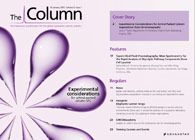Copy cats
The cloning of animals by somatic cell nuclear transfer has been carried out successfully for many years, however, the survival rates of cloned animals is very low. This has been attributed to abnormal gene expression in cloned placentas that results in the loss of the foetus or the death of newly born animals.

The cloning of animals by somatic cell nuclear transfer has been carried out successfully for many years, however, the survival rates of cloned animals is very low. This has been attributed to abnormal gene expression in cloned placentas that results in the loss of the foetus or the death of newly born animals.
A team of scientists in Korea have undertaken a study of the placentas of cloned cats to establish the changes that are occurring as a result of cloning.1 A proteomics analysis was performed in domestic cats to compare cloned term placentas (CTP) obtained from caesarean section (CS) to control placentas obtained from CS or vaginal delivery. The expression of 20 proteins was altered in CTP (p
The team concluded that these results were indicative that impaired cloning in cats was a direct result of abnormal protein production in the placentas. A strategy to restore normal protein expression could increase the efficiency of somatic cell nuclear transfer and, in time, help to establish endangered species.
1. Il-Keun Kong et al., Proteomics, 11(23), 4454–4467 (2011).
This story originally appeared in The Column. Click here to view that issue.
Evaluating the Accuracy of Mass Spectrometry Spectral Databases
May 12th 2025Mass spectrometry (MS) can be effective in identifying unknown compounds, though this can be complicated if spectra is outside of known databases. Researchers aimed to test MS databases using electron–ionization (EI)–MS.

.png&w=3840&q=75)

.png&w=3840&q=75)



.png&w=3840&q=75)



.png&w=3840&q=75)









